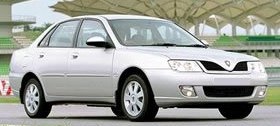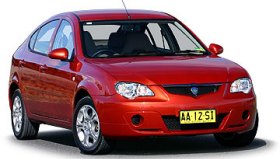
| - |
Main plants: Shah Alam, Tanjung Malim (Proton City).
R&D center: Shah Alam
FY2010/11: 186,769 units (production)
FY2009/10: 181,000 units
FY2008/09: 154,565 units
FY2007/08: 134,117 units
FY2006/07: 99,596 units
FY2005/06: 179,733 units
FY2004/05: 200,167 units
Domestic sales:
2021: 114,708 units (market share 22.7%)
2020: 109,716 units (market share 20.5%)
2019: 100,183 units (market share 16.6%)
2018: 64,744 units (market share 10.8%)
2017: 70,991 units (market share 12.3%)
2016: 72,290 units (market share 12.5%)
2015: 102,175 units (market share 15.3%)
2014: 115,000 units (market share 17.4%)
2013: 138,730 units (market share 21.2%)
2012: 141,121 units (market share 22.5%)
FY2010/11: 162,012 units (market share 26%)
FY2009/10: 157,170 units
FY2008/09: ?
FY2007/08: 116,911 units
FY2006/07: 79,008 units
FY2005/06: 166,968 units (market share (40%)
FY2004/05: 187,800 units (market share 44%)
 Waja (Impian) (2001)
Waja (Impian) (2001)Proton kept relying on Mitsubishi technologies (plus some Citroen technologies later on) until the end of 1990s. In order to build its own R&D autonomy, it purchased Lotus group of UK in 1996. A specialized facility was setup at Norfolk to design and engineer cars for Proton. The first fruit came as Waja (or Impian) in 2001. It showed some Lotus character in handling, but the packaging and Mitsubishi engine remained outdated. As Mitsubishi sold out all its stakes in Proton, the latter started sourcing engines from Renault.
In 2004, Proton Gen-2 introduced a modern design and packaging as well as its first locally-built engine, the Campro 16V four-pot. However, both the car and the engine were the works of Lotus again. Proton had high expectation on the Gen-2, but its poor quality - as a result of its bad component suppliers and its own lack of quality control - ruined its reputation. That drove a lot of customers to the rising Perodua (which was established by Daihatsu thus had no such quality problems). Proton once controlled over 70% of the local market in the early 1990s. In 2006, it dropped to 32% and lost its sales crown to Perodua.
 Gen-2 (2004)
Gen-2 (2004)In the latter half of 2000s, Proton developed more cars by itself - Satria, Savvy / Saga and Exora MPV. However, its fortune did not improve much. Export to overseas market had been declining since there were increasingly better alternatives from Korean, Eastern European, Chinese and Indian car makers. Proton said it was opened to international cooperation, but its talk with Volkswagen for merger failed. Meanwhile, domestic sales continued to decline as its market share was eaten up by Perodua and Honda. It relied on the financial help from the government for survival. As the government was not willing to keep pumping money into it, Proton was finally sold to Geely in 2017, ending its independence and the status as a semi-national car maker.